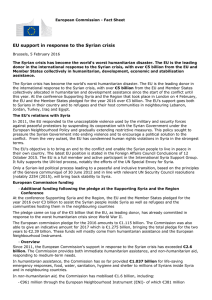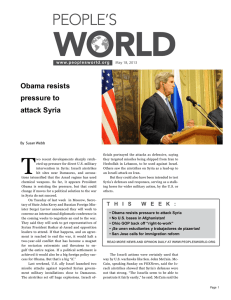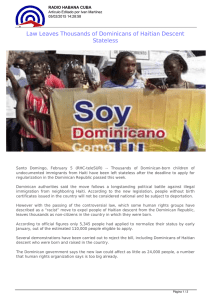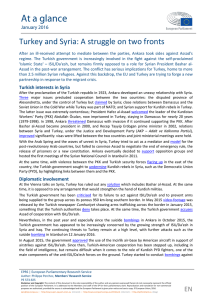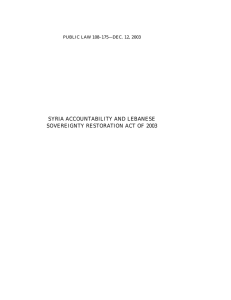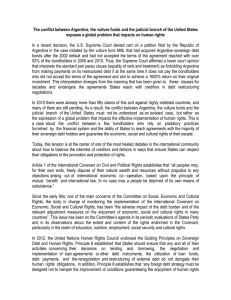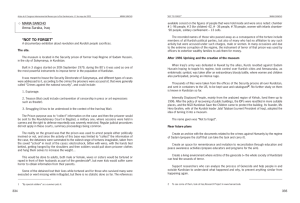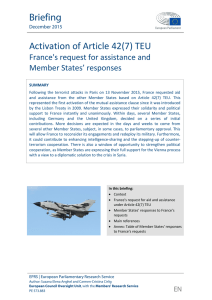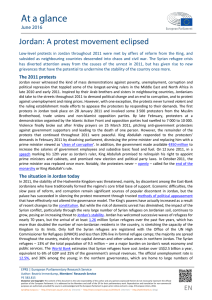buried alive
Anuncio
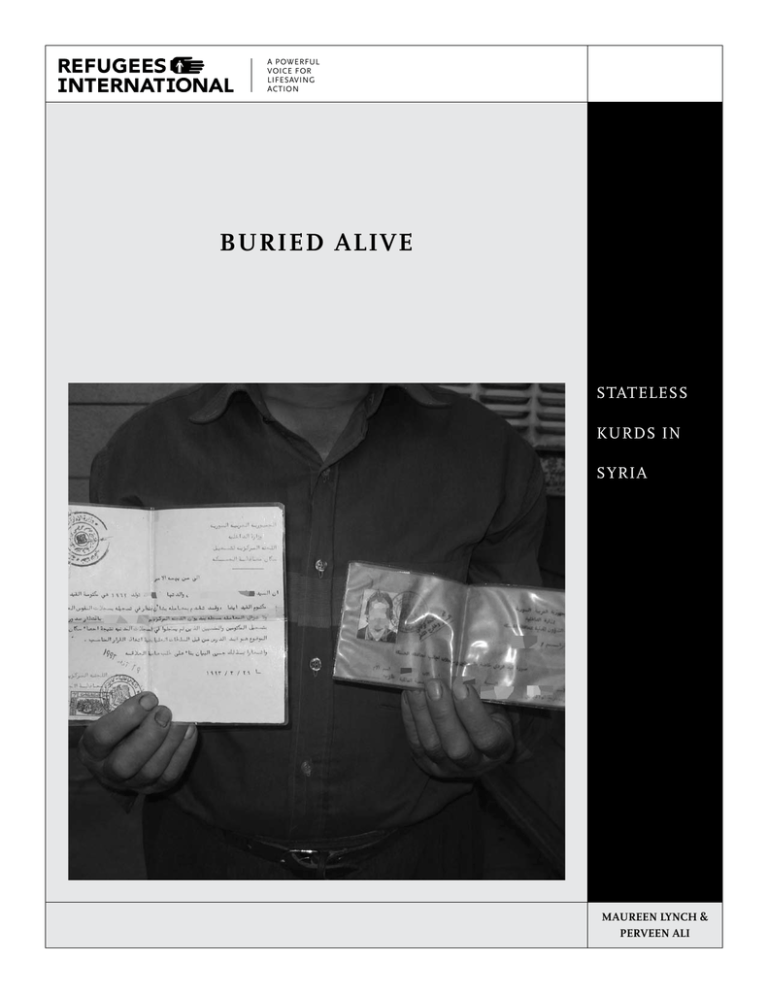
A POWERFUL VOICE FOR LIFESAVING ACTION BURIED ALIVE stateless kurds in syria Maureen Lynch & Perveen Ali Acknowledgments We would first like to offer a true “thank you” to each family and individual who willingly and courageously told us their story. Appreciation is also due everyone who provided support for the original field visit on which this project is based and who helped in the production of this report. In addition, we would like to acknowledge the assistance of Mr. Sherkoh Abbas, a representative for Syrian Kurds in the U.S., who contributed much to the information gathering, field logistics, and editorial comment on documents produced for advocacy on behalf of stateless Kurds. Maureen Lynch and Perveen Ali er, and Bernice Romero for their interest and support. Cover photo: A stateless Kurd in Syria holds his Ajnabi “red card” (on the right) and the identity document belonging to his Maktoumeen wife (on the left). © Refugees International/ Maureen Lynch JANUARY 2006 BURIED ALIVE: STATELESS KURDS IN SYRIA Table of Contents Overview. . . . . . . . . . . . . . . . . . . . . . . . . . . . . . . . . . . . . . . . . . . . . . . . . . . . . . . . . . . . . . . . . . . . . i Introduction. . . . . . . . . . . . . . . . . . . . . . . . . . . . . . . . . . . . . . . . . . . . . . . . . . . . . . . . . . . . . . . . . . 1 The Creation of Stateless Kurds in Syria. . . . . . . . . . . . . . . . . . . . . . . . . . . . . . . . . . . . . . . . . . . 1 Fundamental Human Rights Denied . . . . . . . . . . . . . . . . . . . . . . . . . . . . . . . . . . . . . . . . . . . . . 2 The Right to a Nationality & an Identity. . . . . . . . . . . . . . . . . . . . . . . . . . . . . . . . . . . . . . . . . 3 The Right to Education . . . . . . . . . . . . . . . . . . . . . . . . . . . . . . . . . . . . . . . . . . . . . . . . . . . . . . 3 The Right to Employment . . . . . . . . . . . . . . . . . . . . . . . . . . . . . . . . . . . . . . . . . . . . . . . . . . . . 4 The Right to Health. . . . . . . . . . . . . . . . . . . . . . . . . . . . . . . . . . . . . . . . . . . . . . . . . . . . . . . . . 5 The Right to Marry . . . . . . . . . . . . . . . . . . . . . . . . . . . . . . . . . . . . . . . . . . . . . . . . . . . . . . . . . 6 The Right to Own Property . . . . . . . . . . . . . . . . . . . . . . . . . . . . . . . . . . . . . . . . . . . . . . . . . . . 6 The Right to Freedom of Movement. . . . . . . . . . . . . . . . . . . . . . . . . . . . . . . . . . . . . . . . . . . . . 7 Human Smuggling & Trafficking . . . . . . . . . . . . . . . . . . . . . . . . . . . . . . . . . . . . . . . . . . . . . . . . 7 Arbitrary Detention & Torture . . . . . . . . . . . . . . . . . . . . . . . . . . . . . . . . . . . . . . . . . . . . . . . . . . . 8 Relationship with UN Bodies. . . . . . . . . . . . . . . . . . . . . . . . . . . . . . . . . . . . . . . . . . . . . . . . . . . . 9 Resolving the Problem . . . . . . . . . . . . . . . . . . . . . . . . . . . . . . . . . . . . . . . . . . . . . . . . . . . . . . . . . 9 Refugees International’s Recommendations. . . . . . . . . . . . . . . . . . . . . . . . . . . . . . . . . . . . . . . . 10 www.refugeesinternational.org overview Syria is at a critical crossroads, faced with a timely opportunity to maintain stability and security in the country by realizing the nationality and its concomitant rights of all residents. In particular, an estimated 300,000 stateless Kurds live within the country’s borders, but are in a unique situation in relation to the larger Kurdish population due to a 1962 census that led to their denationalization. “Promises are made by the authorities, but in practical life there are no changes.” The lack of nationality and identity documents means that stateless Kurds, for all practical purposes, are rendered non-existent. Their basic rights to education, employment, property ownership, political participation, and legal marriage are severely limited, relegating them to the outermost margins of Syrian civil society. “It is like being buried alive,” said one man. In an attempt to mitigate the desperation of their plight, some Kurds have begun to mobilize themselves to advocate for their recognition. Others take tremendous risks to leave Syria illegally and seek opportunities abroad. However, those caught may be deported back, imprisoned, and subjected to harsh treatment. Individuals who actively tried to change the situation for stateless Kurds have also been detained and tortured. In his speech on November 10, 2005, President Bashar Al-Assad of the Syrian Arab Republic said that he wants to resolve issues of nationality in the Hassakeh region. “We will solve this issue soon in an expression of the importance of national unity in Syria.” But over the years, many government promises about resolving the plight of stateless Kurds have been made and broken. “Promises are made by the authorities, but in practical life there are no changes,” one stateless man told Refugees International. While the Syrian government deserves credit for decades of assistance to hundreds of thousands of Palestinians, and now to the growing number of Iraqi refugees present on their territory due to the ongoing crisis in Iraq, it must recognize in a concrete way the rights of hundreds of thousands of individual Kurds within its own borders who have been arbitrarily denied the right to Syrian nationality. The Syrian government needs to repeal all draconian restrictions on the free expression of Kurdish cultural identity and grant citizenship to individuals who lack it. President Al-Assad needs to make good on his promises now. For only when the stateless Kurds in Syria have been fully nationalized and the broader issue of the Kurdish place in Syrian political, social, and economic life has been addressed can peace and security within Syria be realized. Refugees International recommends that: The Government of Syria •Take immediate and concrete steps to fulfill the promise to grant citizenship to all individuals lacking effective nationality in accordance with Article 3 of the Syrian Nationality Act and international law. •Repeal all laws and decrees which deny Kurdish people in Syria the right to enjoy their own culture and language. •Begin a program of reparations and development for Kurds who lost property and status in 1962 that is at the same time sensitive to the rights of Arab occupants. i BURIED ALIVE: STATELESS KURDS IN SYRIA •Ensure every child born in Syria has the right to acquire a nationality and is not stateless. •Enact legislation to permit passage of nationality from mother to child. •Become party to the 1954 Convention Relating to the Status of Stateless Persons and the 1961 Convention on the Prevention of Statelessness. The UN High Commissioner for Refugees •Broaden its focus and operations to include stateless persons in addition to refugees as mandated. •Work with the Syrian government to end statelessness in the country, including affected Kurds. Only when the •Provide relief consistent with its agency mandate to address stateless people. in Syria have been •Identify a staff team to work actively on ending statelessness in Syria. fully nationalized •Open UNHCR branch offices in regions of the country where statelessness is most severe. and the broader The United States & Concerned Governments •Establish a clear policy on Kurds in Syria, urging the Syrian government to resolve the statelessness issue. stateless Kurds issue of the Kurdish place in Syrian political, •Refuse to become party to agreements with Syria until the fundamental rights of Kurds are upheld, particularly the EU’s formation of the Mediterranean Partnership with Syria. social, and •Include more details on conditions faced by stateless persons in annual human rights reports. been addressed •Support the development of civil organizations, including ones to achieve greater communication and understanding between Syrian Arabs and Kurds. economic life has can peace and security within Syria be realized. www.refugeesinternational.org ii buried alive stateless kurds in syria introduction As a whole, Kurds in Syria continue to face obstacles to securing their basic rights. Stateless Kurds in Syria are virtually invisible people. Numbering about 300,000, this group is in a unique situation in relation to the larger Kurdish population. There are no exact figures for the number of Kurds in Syria because of the political implications of over- or underestimation, although it is generally believed that between 8 and 15 percent of the country’s population of 18 million is Kurdish. About half of them live in the northeast section of the country (Hassakeh and Jazeera) and in Afrin and northern Aleppo. The other half is dispersed throughout the urban centers of Damascus and Aleppo. In addition, large numbers of Syrian Kurds are living in Lebanon and throughout Europe. As a whole, Kurds in Syria continue to face obstacles to securing their basic rights. The legacy of the state’s “Arabization” and nationalism campaigns of the 1960s and 70s, conducted with the objective of gaining control of all internal social spheres by restricting political and civil rights in the name of internal stability, continues to this day. Discriminatory regulations ban use of the Kurdish language Kermanji (including in conversation, publications, the names of children, and place names), cultural displays (such as playing Kurdish music), and the formation of Kurdish civil and political groups. The creation of a Kurdish autonomous zone in Iraq pushed the Kurdish issue to the forefront in Syria where stateless Kurds seek citizenship and recognition as a major group in the country. The main obstacle to a solution of the nationality question is political. Over the years, the government has failed to recognize the size of the problem in order to preserve the domination of political and social life by the ruling party of the Al-Assad family and its allies, who represent the interests of the Arab majority. The denial of citizenship is part of a broader effort to prevent any legal expression of Kurdish nationalism on Syrian soil. Some Syrian officials deny that any problem exists, maintaining that only a small number of families live without nationality. Only when the stateless Kurds in Syria have been fully nationalized and the broader issue of the Kurdish place in Syrian political, social, and economic life has been addressed can peace and security within Syria be realized. The Creation of Stateless Kurds in syria The majority of Kurds are divided between Turkey, Iraq, Iran, the former Soviet Union, and Syria. Some of Syria’s Kurds became stateless when a census was conducted in 1962 in the Hassakeh governorate under Decree No. 93. An estimated 120,000 people or about 20 percent of Syrian Kurds lost their citizenship, a number which has since more than doubled to approximately 300,000 at present. Many persons who lost their nationality also later lost rights to their property, which was seized by the government and used for the re-settlement of displaced Arabs. The Kurds whose land was seized were not compensated for their losses. Moving Arabs onto this land ensured that a strong barrier of Arabs existed along the border of Turkey between the Kurds living in Turkey and in Syria. The census reflected a political agenda to Arabize the northeast, an area rich in natural resources, and to identify recent illegal migrants from Turkey. To retain their citizenship, Kurds had to prove residence in Syria dating from 1945 or before. Implementation of this order went awry. Even Kurds with proof of residence lost their nationality; others were compelled to pay large bribes to retain it. One man stated, “The grave of my BURIED ALIVE: STATELESS KURDS IN SYRIA grandfather is here in Syria; our family has been here for over 100 years, but we lost our nationality in 1962.” To this day many families have members who are nationals and others who are not. Fathers have nationality, while their children do not; one man has nationality while his brother does not. Many stateless Kurds also report having family members who served in the Syrian military and whose nationality was then rescinded upon completion of their service. The law also states that Syrian nationality shall be given to foreigners by special decree after a written application proving that the applicant: The results of the census of 43 years ago continue to cause great suffering. “You can’t imagine the condition of people without a nationality,” one man said. “It violates international laws to which Syria is a signatory and Syrian domestic law itself.” •Is of good repute; According to documentation prepared by the UN High Commissioner for Refugees, Article 3 of the Syrian Nationality Act stipulates that a person is considered legally Syrian if he or she is: a) Born inside or outside the Syrian Arab Republic of a Syrian father; b) Born inside the Syrian Arab Republic of a Syrian mother but never proven legally descendant of his father; c) Born inside the Syrian Arab Republic of unknown parents, parents with anonymous nationality or parents with no nationality. Foundling children in the Syrian Arab Republic are considered Syrian born (and registered in the area they are found in) unless proven otherwise; d) Born in the Syrian Arab Republic and was not able at birth to acquire (by virtue of paternity) foreign nationality; e) One who is originally Syrian but neither acquires another nationality nor applied for Syrian citizenship within the appointed times of previous legislations. This Article applies even if date of birth of concerned person is prior to the date of this legislation coming into force. •Is legally competent; •Has lived in the Syrian Arab Republic for five consecutive years; •Is free from infectious diseases and physical disabilities hampering him from work; • Has not being previously convicted; •Has a specialty or experience in certain fields; “You can’t imagine the condition of people without a nationality.” •Has fair knowledge of written and spoken Arabic. As it has in the past, once again this summer the Human Rights Committee, the body of independent experts that monitors implementation of the International Covenant on Civil and Political Rights by its State parties, called on Syria to “protect and promote the rights of non-citizen Kurds.” The European Union has also sent a letter signed by several member states to President Al-Assad urging him to rectify this prolonged situation. Fundamental Human Rights Denied The difficulties faced by stateless Kurds in Syria are numerous, despite Syria’s obligations as a signatory to the Universal Declaration of Human Rights, the International Covenant on Civil and Political Rights, the Convention on the Rights of the Child, and the International Convention on the Elimination of All Forms of Racial Discrimination. Individuals have irregular access to education, health care, livelihoods, travel, property ownership, judicial and political systems, and registration of businesses, marriages, and children. They cannot vote or run for public office. www.refugeesinternational.org “After finishing university, the painful life began. We saw our classmates and friends get jobs and buy houses, according to their lessons… Now I am 43 years old. I am a lawyer by training, but I, my wife, and children work in a shop moving heavy appliances.” Statelessness affects every part of daily life. “Our condition is worse than that of a criminal,” a man from Qamishli said. “They can own a car or house. We can’t.” A young woman told RI, “When I was young, I was not sensitive to my status. Now I know it will affect my education, my job, and my marriage.” The births and deaths of some Maktoumeen (individuals lacking identity documents; the term is defined as “hidden” by some and “unregistered” by others) go unrecorded and their murders are reportedly not investigated or prosecuted as a result of their status. They are people who never existed. One young stateless man summed up this treatment in a single statement: “The Syrian government wants to erase us.” The Right to a Nationality & an Identity Most denationalized Kurds and their descendents are labeled Ajanib (“foreigners”) and issued red identity cards by the Ministry of Interior, stating they are not Syrian nationals and are not entitled to travel. Even some children listed on red cards are listed under the statement, “His name was not in the survey of 1962,” an irony given that they were born long after the date of the census. Replacing such documents or obtaining them for the first time poses particular problems, as they often involve paying large bribes of up to SYP 3,000-5,000 (US $60-100) and approaching several branches of security for authorization over the course of months or even years. A significant number of stateless Kurds in Syria do not possess even this identity document and are effectively invisible. Maktoumeen now number between 75,000 and 100,000. At one time, they were able to obtain certified “white papers” recognizing their identity from their local mayor’s office (a Mukhtar or traditional village head), although these papers were not recognized legally by the government. However, this practice has now ended under special orders from the Syrian government. One man reported being arrested for possessing no legal documentation and was in prison for three months. Another reported being harassed by the police who called him names and tore up his white paper in front of him. “The Maktoumeen have the worst situation you can imagine,” one person told RI. “We want humanity. We want respect as human beings,” one man said. “Syria is a country of Kurds and Arabs.” “Even with these conditions, we live for this change,” agreed another. The Right to Education The Syrian government recognizes the right of Kurdish children to primary education, but not to primary education in their native Kurdish. Stateless Kurds face difficulties enrolling in secondary schools and universities, and Ajanib were reportedly not permitted to enroll in universities until after 1978. Enrolling in university proves nonetheless to be an arduous task, as Ajanib are required to obtain a report from state security in order to attend university and again upon graduation. This report contains information about the student’s parents, travels, friends, and political involvements. Maktoumeen sometimes use the name of a national or foreigner so they can study, albeit illegally. Kurdish students study with Syrian Arab textbooks and are compelled to recite versions of history that contribute to their invisibility in the country. Stateless university students generally do not have the right to participate in school activities such as athletics teams, social clubs, or competitions or to pursue their professions after graduation. Even those Ajanib who do manage to enroll, find it impossible to obtain employment in many of their fields of expertise. Ajanib are restricted from government jobs and the practice of law, pharmacy, or medicine and practice other professions such as teaching or engineering in severely restricted ways. BURIED ALIVE: STATELESS KURDS IN SYRIA It is next to impossible for Maktoumeen to access higher education. Not only must the children go through considerable administrative processes and delays in registering for primary education, but they must also obtain permission from state security to attend secondary school. Maktoumeen children do not receive a diploma from secondary school, preventing their university enrollment. Some parents even report listing their children under the names of relatives who have nationality in order to facilitate their access to school. No stateless Kurds, even those at the top of their class, can access government scholarships for post-graduate education abroad, and unlike Syrian nationals, they cannot receive government loans or stipends for their undergraduate university education. In addition, stateless Kurds with a disability cannot obtain state-funded special education. One young Kurdish girl was prevented from going to a school for disabled children because she is Maktoumeen. A young Maktoumeen man was reported as having the highest marks in his high school class, but upon graduation was not provided with a diploma and unable to apply for college. He is now working selling tea in front of the University of Damascus, where he had dreams of one day attending. Another Ajnabia woman remembers how her Arab primary school teacher would humiliate her in front of her class by asking, “Where is your father really from?” The Right to Employment With limited access to employment, a majority of stateless Kurds in Syria works two to three jobs at any given time in the informal sector or practices professions without a license or in an extremely limited capacity. They cannot practice agriculture on the land which was taken from them. Moreover, most stateless Kurds are not permitted to become members of professional labor unions, with the exception of the Engineers’ union on a limited basis. “I work night and day, but still have nothing,” a Maktoumeen man told RI. “Because our life is hard, we think only of how to eat.” In rare cases in which the state is facing a shortage in a particular profession, the government makes arbitrary exceptions. For example, a shortage of teachers in Qamishli led the government to permit hiring stateless Kurds as teachers on a part-time or day laborer basis, meaning that they had no contract and benefits and could be terminated at any time. In another case, the need for more engineers led the government to permit stateless Kurds to work as engineers on government projects, but this program was terminated after two years when it was deemed they were no longer needed. One man reported actually obtaining government employment, but after one year, they discovered that he was Maktoumeen, fined him, and fired him from his job. Private hotels and restaurants are required now by law to consult state security before hiring any Kurds. One man stated, “Kurdish people want to return to their lands, but are instead obliged to migrate to cities to work and live miserable lives.” As a consequence, it is not uncommon to find a doctor who sells tea on the street, a lawyer who works as a barber, a man who was educated as a teacher transporting flour sacks, and another who left his family in the northeast region to work in a Damascus hotel restaurant. Earnings for such work average around SYP 6,000 (US $120) per month, nearly half of which must go to pay rent for housing and barely supports a family of four for more than two weeks. One man stated, “If I work night and day, I will gain nothing, just survive.” Due to the inability to find employment, one Syrian Kurdish man explained how he lost his citizenship in the 1962 census, but then in 1975 agreed to sign a statement that he was a Syrian Arab in order to retain rights associated with Syrian citizenship. This was an option offered by the Syrian government in the late 1970s to some of the Ajanib who lost their nationality in 1962; however, most Ajanib refused as a matter of principle, and the practice was effectively ended by 1980. www.refugeesinternational.org Unlike the Maktoumeen, Ajanib can obtain drivers licenses and cash checks, but neither are permitted to open bank accounts or obtain commercial drivers licenses. One Maktoumeen man reported receiving paychecks or entering into contracts for work under the name of a friend who has nationality in order to be able to receive and cash paychecks at banks. “Once I needed to travel from Qamishli to Damascus to receive medical treatment, but the bus company refused to issue me a ticket; so I had to buy a ticket using the identity card of a relative who has Syrian nationality,” one man explained. Another Maktoumeen man described how companies often exploit Maktoumeen labor due to lack of documentation. He stated, “I had contracted with a government-owned company to do a construction job laying telephone lines with a crew of men that I hired. The company agreed to pay me SYP 85,000 (US $1,700), but after we finished the work, the company refused to pay me. They said that I do not possess an identity card and therefore cannot receive a paycheck. Now I have to find some other way to pay the men who I hired for this project.” Economic consequences of limited access to the labor market and lack of trust in the education system compel many Maktoumeen children to work picking cotton, selling cigarettes or lottery tickets, cleaning windows, shining shoes, working as porters, and helping in mechanic shops. Many child laborers are exploited in the market and forced to pay the police bribes in order to continue their work. A number of these children suffer from ailments connected with poor nutrition, such as anemia and rickets. Many stateless Kurds residing in the northeast have also been compelled to move into larger urban centers such as Damascus, Homs, Hama, or Latakia to find work in the informal sector. In the neighborhood of Wad El Mashariya Zor Ava, on the outskirts of Damascus, for example, nearly 2,000 stateless Kurdish families, many of whom work in construction, are living in settlements constructed without legal building permits. Most of these families have relatives and close family members still living in the northeastern region of Syria. Unemployment in this neighborhood has been associated with increasing levels of petty crime, poor academic performance, isolation, and depression amongst Kurdish youth. The Right to Health Stateless Kurds are prohibited from accessing Syrian public health services or hospitals as either employees or patients, although in some rare emergency cases, they may be granted limited admission. They are instead forced to seek the services of private doctors and health clinics, where costs can be prohibitive and the numbers of which are limited. Many stateless Kurds report how it is common for them to use the identity cards of friends or relatives who are nationals in order to obtain public health care. In Kurdish areas there are no specialized hospitals, so patients must travel outside the northeast for care. A young man, who was shot during the days of unrest that followed a March 12, 2004 incident in a Qamishli stadium in which live ammunition was used against unarmed Kurdish civilians after clashes between Arab and Kurdish fans erupted, said he would not be alive except for Kurdish doctors who helped him in a private clinic. Another stateless Kurdish man reported having a life-threatening injury, which cannot be treated in Syria. He stated, “The Syrian government refused to issue me with a travel document that would enable me to seek treatment abroad, even though my disease cannot be treated in Syria. Once, when I was unable to walk due to my illness, I sent my wife to obtain a bus ticket for me to travel to a hospital in Damascus to receive care. When she approached the bus station, they refused to sell her a ticket for me because our marriage is not officially registered, and she thus has no legal relation to me.” There is also concern about psychological problems developing amongst stateless Kurdish youth. One parent said, “The youth see the Arabs and see themselves. They don’t have money. There is no place for the BURIED ALIVE: STATELESS KURDS IN SYRIA children to play. They stay at home. Their study is not good.” A 25-year-old man who works in food service told how he witnessed a birthday party in the restaurant with cake and much jubilation. He cried to himself that he had never had and would never have the opportunity to celebrate his own birthday that way. At the heart of the culture of frustration that has developed among the Kurdish youth lies several concerning elements that could breed future instability, including intellectual repression, cultural resentment, and economic disparity. The Right to Marry Official marriage registration is a particularly painful point for many stateless Kurds. Male nationals who marry women who are Ajanib may register their marriages and pass their status to their children. All other marriages, such as those between Ajanib and Maktoumeen or a marriage between a stateless man and a woman who is a Syrian national, cannot be registered officially, even if a court decree is obtained recognizing the marriage. One man reported that he was only able to legalize his marriage after twelve years of approaching different branches of security and obtaining a court decree recognizing the marriage. Married couples in such families are listed on their identity cards as “single,” which poses problems for the registration of children on family identity cards and even prevents husband and wife from sharing a room in a hotel. It is sometimes difficult to obtain birth certificates for children when the parents do not have a marriage certificate. Many Kurdish families who have Syrian nationality refuse to allow their children to marry Ajanib or Maktoumeen for these reasons. Other Kurds feel that status should not be an issue when it comes to marriage, as the Kurds as a group must demonstrate solidarity. One Syrian Kurdish national stated, “I sympathize with them; I must persuade all Kurdish citizens not to refuse this kind of marriage. We see this as the whole community’s problem, even though only about 10 percent of us are stateless.” A father of seven said, “My first daughter who has nationality married a stateless man as a way to solve his problem because he could then register their property in her name. A stateless woman reported leaving the country illegally to marry and register under a different family name. “When she comes here [Syria], she isn’t our sister,” her blood brother said. “I am very much in love with a woman, but her father refused to allow us to marry, telling me that because I have no nationality, I have no future… To this day we both remain single.” The Right to Own Property Ownership and registration of businesses and property is also difficult. With no nationality, Kurds cannot obtain property deeds or register cars or businesses. WIFE HUSBAND Can their marriage be legally registered? Can their children be legally registered? Maktoumeen National NO YES—under father Maktoumeen Ajanib NO YES—under father Maktoumeen Maktoumeen NO NO Ajanib National YES YES Ajanib Ajanib NO YES—under father Ajanib Maktoumeen NO NO National National YES YES National Ajanib NO YES—under father National Maktoumeen NO NO www.refugeesinternational.org One woman described a man who went with people smugglers: “On the way, he was shipwrecked and left on an island with 25 other people and with little food or water for 14 days… They knew they were going to die and began digging their graves by hand. They were rescued by an Australian pilot who happened to be flying over the island…” Ironically, they are still required to pay property taxes to the government on the land they do not legally own. Some register their property under the names of friends or relatives who are nationals to circumvent these issues. Yet this arrangement forces them to rely upon the good faith of such persons, and the problem still remains that they cannot pass on ownership of property to their children. One man described how he sold his house, but the new owner is unable to move in because the current tenants who are renting the house refuse to leave, and he has no legal recourse to evict them due to his lack of registered legal ownership of the property. Individuals who marry Syrian nationals often register property under the names of their spouses. Passing the property title on to their children is dependent upon how closely the spouse’s family adheres to custom. In some instances of divorce, the spouse with nationality will retain the house, even if the stateless spouse purchased it. In other cases, many stateless Kurds are living in houses registered to the names of previous Arab owners, even though they paid money to purchase them because they cannot register the title under their names. Hence, their security is subject to the good graces of the sellers and the government to whom they often pay large bribes. The Right to Freedom of Movement Stateless Kurds are unable to obtain travel documents for purposes of travel outside of Syria, regardless of whether it is for study, travel, attending funerals or family gatherings, or obtaining urgent medical treatment. One example cited was that of two Kurdish musicians who were prevented from traveling with their troupe to attend a music festival outside of Syria. The International Committee of the Red Cross has agreed that it might be possible to issue travel documents with an invitation from abroad and Syrian government approval. Many stateless Kurds report difficulties in traveling within Syria’s borders as well. In the past, they were required to obtain permission from state security for internal travel, but recently have been permitted to travel internally with more freedom. However, they still report being stopped and interrogated by police, forced to obtain permission if they are students, and prevented from staying in hotels without permission from state security. As noted above, married couples are not allowed to sleep in the same room in hotels because they are listed as “single” on their red cards. Many Maktoumeen are prevented from staying in hotels at all due to lack of an identity document. Those without any documentation often face trouble in obtaining bus tickets and are questioned by the police, even after producing a birth certificate verifying their birth in Syria. There are additional problems for Ajanib who wish to change their residence. Unlike Syrian nationals, they must obtain permission from state security in order to change their place of residence. One young university student in Aleppo was required to do this when he wished to move out of the student dormitory. The restrictions on movement are a grave disadvantage, preventing possible economic, academic, cultural, and civil society projects within the Kurdish community and in Syria as a whole. Furthermore it contributes to the culture of frustration that has characterized a large portion of the Kurdish population in Syria. The obstacles to free movement have enhanced the risk of regional discontent and instability. Human Smuggling & Trafficking Having few options to ensure basic survival and experiencing depressed relative development, some stateless Kurds seek their opportunities abroad. One estimate offered to Refugees International was that up to 50,000 Kurds have now left Syria, the majority of whom are stateless. While no official statistics BURIED ALIVE: STATELESS KURDS IN SYRIA are available, it is said that most families have had at least one member smuggled to another country. Foreign officials confirm that individuals making asylum requests say they use traffickers to arrange their departure. Smugglers usually send from 50-100 people abroad at a time. There was a cited example of one person who was able to obtain a Syrian passport with a SYP 1 million bribe (US $20,000) paid to the government. Another person described how his son plans to go with people smugglers to Germany because he had a medical license but is unable to practice legally as a doctor in Syria. With no travel documents, individuals take tremendous risks attempting to leave Syria, entrusting their safety to human smugglers and paying sums between SYP 150,000 and 600,000 (US $3,000 to 12,000) per person. They risk death, deportation, and imprisonment as consequences. One stateless family, who was caught in Cyprus and deported back to Syria, spent more than three months in prison until they could bribe their way out. Another man spent a year and a half in prison, where he was tortured and was rumored to have been killed. Many have died at sea in shipwrecks or while detained in prisons. Some stateless Kurds attempt to leave the country with false passports in order to study and practice professions. One woman described how her brother went to Kazakhstan to study dentistry. He purchased an Iraqi passport for US $200, added his photo, and left Syria. He is now unable to return to Syria because the false passport has expired. Another man went to Russia on an illegal passport to study medicine and received a license to practice. He returned to Syria and was arrested at the border. His family had to pay hefty bribes for his release. Some returnees who have red cards escaped Syria, sought political asylum in Europe, were rejected for refugee status, and then deported back to Syria where they were reportedly detained and tortured. One man, deported from Germany after a failed asylum application, was sentenced to two years in prison by the high security court and severely tortured. The average length of detention for seeking political asylum abroad was reported to be three to six months. Another man died on the road while fleeing Syria, and the government refused to allow his body to be returned to his family in Syria. One young Ajnabi student described a family he knows with five children who went with people smugglers to Egypt and were left stranded there for six months until they agreed to pay the smugglers SYP 1 million (US $20,000) to go to Europe. They were afraid to return to Syria because they feared arrest and prolonged detention. Arbitrary Detention & Torture Some Kurds have been subjected to arbitrary detention and torture as a consequence of their efforts to rally for the political and legal recognition of stateless Kurds in Syria. In July 2005, following the children’s demonstration for the rights of stateless Kurdish children in Syria in front of UNICEF, eight accompanying adults were detained. One former detainee explained how he was tortured and kept in solitary confinement for fourteen months. Another said his captors put shoes in his mouth and on his head. They tortured him with electric shock and by using “the chicken,” a technique that involves stretching the persons out along a long rod, binding the hands and feet at either end, and then rotating them. In 1992 M. Jamil, an Ajnabi lawyer interviewed by Refugees International, was arrested for his alleged involvement in a campaign to return nationality to the families of stateless Kurds who were deprived of it in 1962. Ajanib and nationals alike participated in the protest by posting banners and signs demanding the stateless Kurds be given their rights and nationality in Syria, and more than 300 people were arrested, many of whom were sentenced to up to three years in prison. Mr. Jamil was detained without www.refugeesinternational.org The authorities accused M. Jamil of being an opposition member: “You Kurds are living on our land as guests. You are living in our country, but are against us... We saved you from the Turkish regime, and now you want rights. People without nationality in Syria do not exceed 5–10 families.” “The world has shut its eyes to our problem.” charge and tortured by a gang of five men almost to the point of death in order to force a confession from him. He was verbally abused, beaten and punched, brutally kicked in his back, raped with a bottle, forced into a tire, electrocuted multiple times with wires attached to his genitals and toes, starved, and psychologically tortured. He suffered unconsciousness and severe injuries to his spinal column and eye as a result. He was tortured along with six other accused people, three of whom were Ajanib; one man was nearly 60 years old and bled from the rapes for nearly five days. Mr. Jamil was kept for 21 days in a 70 inch by 66.3 inch room, sometimes in solitary confinement and other times with another person. Relationship with UN Bodies “The world has shut its eyes to our problem,” declares a stateless Kurd. Syria and the world community, led by the United Nations High Commissioner for Refugees (UNHCR), must take concrete steps to end statelessness. Many stateless Kurds reportedly fear approaching the UNHCR due to perceived political connections between the United Nations and the Syrian government. This was largely exacerbated by the July demonstration held in front of UNICEF, when stateless Kurdish children and their relatives marched there asking for the recognition of their rights and were met with police brutality and arrests. There was no intervention on the part of any UN office or official, even after agencies were approached by relatives of the demonstrators for assistance in securing the release of the eight men who were detained. Resolving the Problem For purposes of ensuring both human rights protection of stateless Kurds and the political stability of Syria and the larger Middle Eastern region where Kurds reside, it is critical that Syria take steps now to reinstate nationality to both the Ajanib and Maktoumeen. Economic and social marginalization amongst this population is increasingly likely to foster considerable despair, hopelessness, and unrest. Thousands of highly educated and qualified Kurds who have much to offer to Syrian development now wait on the sidelines to become full-fledged and integrated members of Syrian civil society. They have much to offer the country in terms of professional capacity, and this vast pool of human resources is currently being wasted. As an intermediary step, the UNHCR, which has a mandate for stateless persons, should be playing a proactive role in advocating for the protection of Kurds without nationality in Syria, but has yet to act assertively on their behalf. The UNHCR told Refugees International that they did encourage the Syrian government to resolve the stateless problem upon the President’s recent visit to Hassakeh. However, there has been no evidence of follow-up other than a promised government initiative to grant citizenship to 30,000 stateless persons, which was frozen after the Qamishli uprising. The government reportedly conducted a confidential census of stateless Kurds in the northeast earlier this year, but no numbers have been officially released. Ultimately, however, it is the obligation of the Syrian government to take steps to rectify this serious and growing problem. The Syrian government should grant citizenship to all individuals lacking effective nationality in accordance with Article 3 of the Syrian Nationality Act and with international law. In an effort to support their integration into Syrian society after citizenship is granted, RI encourages the Syrian government to begin a program of reparations and development for Kurds who lost property and status in 1962 and promote the recognition of Kurdish culture and language within Syrian society. It is also critical to ensure that Kurds have equal opportunities for local participation. Equality will help facilitate unity. To prevent statelessness from injuring the security of the nation in the future, RI urges the Syrian government to ensure that every child born in Syria has the right to acquire a BURIED ALIVE: STATELESS KURDS IN SYRIA nationality and is not stateless. One opportunity to achieve this goal is to enact legislation to permit passage of nationality from mother to child. Furthermore, RI encourages Syria to become party to the 1954 Convention Relating to the Status of Stateless Persons and the 1961 Convention on the Prevention of Statelessness. The EU has put further pressure on the Syrian government this year to reinstate the nationality of the denationalized Kurds, including the Maktoumeen. They must maintain their insistence that the problem be rectified. In addition, the Syrian Kurdish diaspora in the U.S. is becoming increasingly active in seeking non-violent solutions to issues faced by national and stateless Kurds alike. In November, President Al-Assad again made a public speech announcing his intention to resolve the problem of Kurds denationalized in the 1962 census. However, it remains to be seen whether there will be concrete follow-up on these guarantees or whether they will remain promises unrealized for a sizeable number of the Kurdish population living in Syria. •Ensure every child born in Syria has the right to acquire a nationality and is not stateless. •Enact legislation to permit passage of nationality from mother to child. •Become party to the 1954 Convention Relating to the Status of Stateless Persons and the 1961 Convention on the Prevention of Statelessness. The UN High Commissioner for Refugees •Broaden its focus and operations to include stateless persons in addition to refugees as mandated. •Work with the Syrian government to end statelessness in the country, including affected Kurds. •Provide relief consistent with its agency mandate to address stateless people. •Identify a staff team to work actively on ending statelessness in Syria. seen whether there will be concrete follow-up on these guarantees or whether they will remain promises unrealized. •Open UNHCR branch offices in regions of the country where statelessness is most severe. refugees international’s recommendations The United States & Concerned Governments Refugees International recommends that: •Establish a clear policy on Kurds in Syria, urging the Syrian government to resolve the statelessness issue. The Government of Syria It remains to be •Take immediate and concrete steps to fulfill the promise to grant citizenship to all individuals lacking effective nationality in accordance with Article 3 of the Syrian Nationality Act and international law. •Refuse to become party to agreements with Syria until the fundamental rights of Kurds are upheld, particularly the EU’s formation of the Mediterranean Partnership with Syria. •Repeal all laws and decrees which deny Kurdish people in Syria the right to enjoy their own culture and language. •Include more details on conditions faced by stateless persons in annual human rights reports. •Begin a program of reparations and development for Kurds who lost property and status in 1962 that is at the same time sensitive to the rights of Arab occupants. •Support the development of civil organizations, including ones to achieve greater communication and understanding between Syrian Arabs and Kurds. www.refugeesinternational.org 10 A POWERFUL VOICE FOR LIFESAVING ACTION phone: [202] 828–0110 n facsimile: [202] 828–0819 n e-mail: ri@refintl.org n www.refugeesinternational.org n 1705 N Street, NW n Washington, DC 20036
